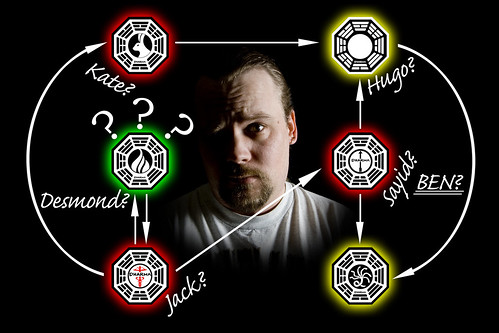I've been tagged in a meme that asks some pointed questions of writers. It's a neat "pay it forward" idea put out there by
Frank "Chip" Etier, who's been a steady contributor at
Weekend Writing Warriors. Some peeps I've come to think of as good friends were first encountered on WeWriWa or its predecessor, Six Sentence Sunday. Writing is, at its core, a solitary pursuit but there's no way you can do it effectively by being 100% alone, IMHO.
What am I working on? --not a simple question! Define "working on". I'm currently engaged in plot wrangling on the novel I started for
NaNo 2013. The working title is
Night Shift. It involves demons, humans, and angels. I'm currently redefining it because I wasn't able to do any planning or plotting before having to jump into NaNo; 34 chapters in, I had to admit that I simply can't write a novel without any planning. I mean I had some general ideas on what to do with the plot but that's nowhere near enough planning.
In the process of learning how to write better, I joined two online critique sites:
Critique Circle and
Scribophile. Each has slightly different things to offer and both are worthwhile. The more I learned about the writing process in general, the more I would think how to apply the various lessons to to the novel that's on my back burner,
Street Glass. Neal and the boys have been in my head for some 30 years. I badly want to write that story when my skills are improved, not when I'm still a writing newbie. I kind of think of
Street Glass as my fine wine--and you know what they say about wine, do not open it before it's time. Or something like that!
So I could make a case for saying I'm working on two projects more or less at the same time, though I'm only actively plotting one of them.
How does my work differ from others of its genre? --also a tough question, even if I stick to Night Shift because I haven't read other stories with demons and angels. I do that on purpose. I don't want to accidentally pick up anybody else's plot, characters, or writing voice. Whatever I write, I want it to come from my weird brain only! But I will say that my demons and angels, while having certain things in common with Christianity, do not reflect any existing religion. My angels always refer to God with ambiguous titles like Holy of Holies and One Without End. I try to even steer clear of using a gender pronoun when referring to God.
Even the demons are not meant to depict Christian ones. Kazimir explains to Devorah that the being she's familiar with as "Satan" is actually much older than that title (and Satan is really a title, not a name). I'm basing my demons on those found in a particular ancient mythology.
Why do I write what I write? --holy cow, pun intended, how do I know? If I want to wax philosophical, I could say that people like me who felt ignored and belittled as children turned to books for comfort because those "people" were always welcoming. They always invited me into their world without any hesitation, it seemed. Once I realized how wonderful it was to get lost in books, it was a short hop to creating my own stories.
Because now, I hold the power! muwahahaha! Of course most fiction, particularly the fantasy sort I like best, tends to need the main characters to suffer somehow in order to keep increasing the tension--this isn't something I made up, it's advice given by well-published authors, and successful agents and editors. I not only bring my characters to tears, I chase them up the proverbial tree and plop snarling wolves at the base of the tree, then I fire flaming arrows into it!
I can put them through heart-breaking times and help them find love everlasting. Bringing these people to "life" is the most amazing thing I've ever done. They're all different facets of me and I can see myself in them sometimes, but other times, I swear I've tapped into some other dimension :D
How does my writing process work? --well, I wish I knew :D I can say this much--I cannot
pants a true story. No, going down that road only leads me into a hedge maze. A story is more than just a string of events--there has to be a coherent plot; a start, a middle, and an end; there should be some sort of climax or high point; and I think the whole thing should
mean something. Without some plotting, I just have a narrative of events and emotions that don't lead anywhere.
I can also say that my stories are character-driven. I'm not really into troop movements across the continent, hard-core science, or predictable plots. What grabs me first is a fascinating person--why they're fascinating is subjective, but overall I'm attracted to characters who are different from most people around them.
In Street Glass, Neal's a card-carrying gang member who desperately wants out of that lifestyle. What traps him is the rule that if you leave and the gang catches you, you are very dead. His opposite in almost every way, Sandy is the drummer in a rock band. He lives the high life but also carries a secret guilt. When Neal kidnaps him, Sandy thinks all he wants is to get back home safe and sound, but then he sees a chance for personal redemption--or is it more than simply personal?
For Night Shift, as I said I'm retooling the plot, but the basic idea is that Devorah is the "point of view" character. She comes from a mixed Jewish-Christian family and isn't strongly drawn to either faith. When her father, the police chief, is gunned down she feels she's lost her biggest supporter and the person who helped her make sense of the craziness that is life. But she doesn't take anything lying down, so when she's recruited into a group of demons who are also servants of the Light, she willingly reinvents herself. She has to maintain her cover as a demon and finds that sometimes, she likes it.
I get seed ideas by asking the age-old question "What if?" For
Street Glass, I got the initial idea from the first verse of the song
Baba O'riley by The Who. To me, the verse sounds like two different people talking, and I wondered, What if those two people met?
With Night Shift, I was drawn to stare at the front porch of a house, shadowed by a fully leafed-out tree. The emptiness seemed to be waiting for somebody. What if that spot was where some dodgy guy came to meet somebody, and what if one of them was up to no good? That led to a scene in draft 1 where Devorah first meets Kazimir in a cemetery, and he does look pretty dodgy to her. I may ditch the scene in the next draft, but without having thought of it, I wouldn't have the story at all.
So there you are :) I think all good writers are basically nosy people :) I'm off to tag three writer friends of mine to keep this thing going. Although before I go, to bring this back around to where I started, I've been able to progress with both novels because I've given and received critiques. Getting them has obvious benefits in that readers point out things they feel don't quite work well, and things that work great. Giving them has more subtle benefits; you gradually train your "ear" to what sounds good and what doesn't, and you realize that some of the mistakes you see in other people's work are the same ones you make yourself--and then you realize that you need to start taking your own advice!
I've gotten some truly wonderful compliments on my writing. That would never have come about without the give and take that happened when I got active with other writers. One of them, when she found out my laptop died and I couldn't replace it, sent me a mini laptop she was no longer using. For free. Simply offered it to me. Writers have kind of a bad rap, people think of them as loners who drink too much and talk to themselves. But they're some of the most generous people on Earth. I'm so honored and humbled to be part of that group.
 Announcement #1 -- I finished the outline for Night Shift :-D I've never written one before but here it is, in its shiny imperfection.
Announcement #1 -- I finished the outline for Night Shift :-D I've never written one before but here it is, in its shiny imperfection.




